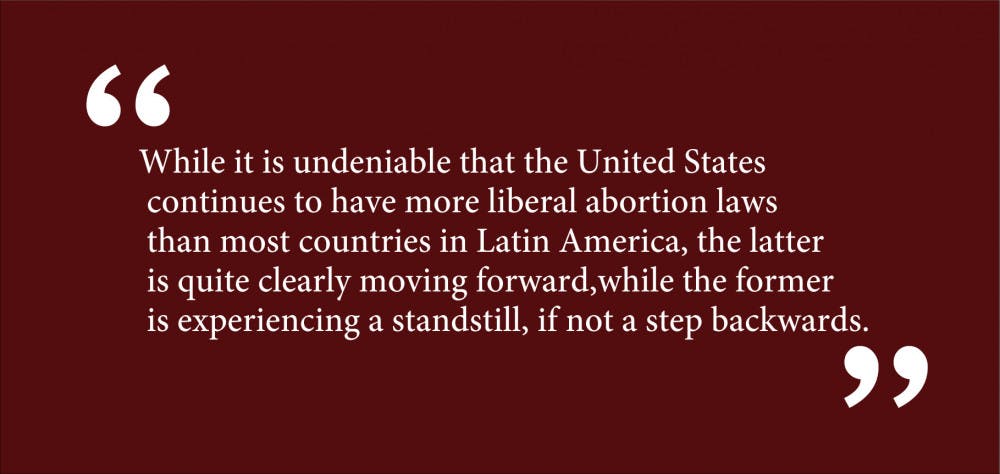Women’s reproductive rights are once more at the center of the political discourse in the United States. As the Senate moves to confirm Brett Kavanaugh to the Supreme Court, a decision that will affect nationwide legislation for decades to come, people around the country are yet again compelled to come out to defend a woman’s basic right to agency over her body. Setting aside the allegations of sexual assault that are by themselves enough to condemn the confirmation as completely unacceptable, Kavanaugh’s political opinions will threaten many of the victories made in the last decades to ensure the rights of traditionally marginalized groups. The right to a safe and accessible abortion is at the forefront of the discussion.
In light of these recent events, it has become evident that the United States is in serious danger of falling behind the rest of the world in the movement to protect a woman’s right to choose. I would like to focus this discussion on the comparison between the development of legislation in the United States and in Latin America, for I believe U.S. literature on women’s issues in Latin American societies highlights some of the fundamental conflicts the United States is facing. Latin America is a region that continues to have some of the most restrictive and oppressive reproductive laws in the world. Only two countries in the region, Uruguay and Cuba, have legalized abortion independent of justification. In some countries like El Salvador, abortion continues to be highly criminalized. However, Latin America has recently experienced a push toward liberalizing abortion laws. There have been large social movements, like those in Argentina, and even actual legislative change, such as in Chile, where abortion became legal in certain circumstances in 2017. While it is undeniable that the United States continues to have more liberal abortion laws than most countries in Latin America, the latter is quite clearly moving forward, while the first is experiencing a standstill, if not a step backwards.
Writers in the United States have written a lot about reproductive rights in Latin America. However, U.S. writers have addressed the issue in the same way they have traditionally written about the region — with problematic oversimplifications and a presumption of moral authority. In the New York Times opinion piece “From Uruguay, a Model for Making Abortion Safer,” the author speaks to the process by which Uruguay first made abortions safe for all woman and later won the struggle to legalize the procedure in all cases. The author begins by noting that Uruguay is “one of the most democratic countries in Latin America,” a clarification any American writer has to make before praising any country in the Global South. For example, this qualification would not have been made in an article about abortion rights in a Western European country, despite the fact that Uruguay ranks better than France in the very study on corruption perceptions that the author sites. Furthermore, this Uruguayan model is presented as an example only for other Latin American and African countries, suggesting the United States has resolved the issue and can learn nothing from the model. A more drastic example is found in examining the literature on Cuba, where American publications very rarely seem to frame the discourse around the fact that Cuba has historically had one of the most progressive reproductive legislations in the world. Instead, writers have focused on the high abortion rates in Cuba, noting that many Cuban women decide to abort their pregnancies because of economic instability or lack of support. No mention, of course, is made that these same situations exist in the United States as well, and that perhaps part of the reason abortion rates are lower here than they are in Cuba is that Americans, especially in more conservative states, do not have the same access to affordable abortions that Cuban women do.
I would like to reiterate that I am not arguing that reproductive rights are, in general, better in Latin America than they are in the United States. The region continues to be highly restrictive, and even the most liberal countries face some of the same issues the United States faces as well as others more specific to their nation’s circumstance. However, I argue that these examples call into question the moral and critical standing that writers from the United States have on the issue. It strikes me as yet another instance in which the neocolonial perspective distorts the ways we perceive the complicated realities that exist in Latin America by translating these realities into our culturally specific framework and thereby oversimplifying them. Furthermore, this distortion serves to give us a false sense of security that we have resolved certain issues. The reality is that, while I am hopeful about the future of reproductive rights in Latin America, I am highly threatened by the recent decisions made in the United States and am wary of what is to come in the future.
If the United States seeks to hold any of the moral and critical standing it claims — which, while highly problematic, is nonetheless widely accepted by most Americans — it needs to actively address its own recurring issues surrounding reproductive rights. The threat to these rights is one that we are experiencing in our very communities right now. This is not the case of some far away injustice affecting people we do not see every day. Critiquing Latin America and other regions while ignoring the deteriorating situation within our own borders is one the most dangerous things we could do.
Marysol Fernandez ’21 can be reached at marysol_fernandez@brown.edu. Please send responses to this opinion to letters@browndailyherald.com and other op-eds to opinions@browndailyherald.com.



